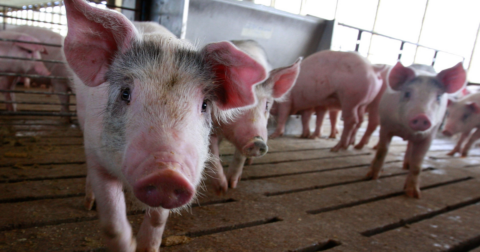Investigation
Industry Groups Worked to Expand Wisconsin Bill Meant for Small Dairies
Factory Farms•7 min read
News
Inside the latest attempt to undo the landmark animal welfare law.


Words by Seth Millstein
In 2018, California voters passed the strongest animal protection law in the country, and it’s been under near-constant attack ever since. After surviving a Supreme Court challenge and multiple legislative assaults, Proposition 12 now faces a new threat: the Food Security & Farm Protection Act, a new piece of legislation that was announced last week.
The GOP-sponsored bill is explicitly aimed at undoing Proposition 12, which requires farmers to give certain livestock animals a specific amount of space on their facilities. However, experts say that it could also potentially threaten over 1,000 public health, safety and welfare laws across the country.
While the Food Security & Farm Protection Act itself is new, the approach to undoing Prop 12 isn’t. “This has been the Big Ag playbook for quite a while, and it’s taken various legislative forms,” Rebecca Wolf, senior food policy analyst at the nonprofit Food and Water Watch, tells Sentient. “Big Ag doesn’t want to be told what to do by states, and so it puts Republicans in a really interesting position that puts them between Big Ag and more of a states’ rights framework.”
But some Republicans strongly oppose this latest attempt to repeal Proposition 12, and so do a lot of farmers. Politics makes for strange bedfellows, and the fight over Proposition 12 is a perfect illustration of why.
Initially passed by California voters in 2018, Proposition 12 is a state law that regulates the conditions in which certain livestock are reared, and additionally, the type of livestock products that can be sold in the state. Both components of the law are centered on how much room the animals are given to live.
Proposition 12 imposes minimum space requirements for breeding pigs, egg-laying hens and veal calves. Breeding pigs must be given at least 24 square feet of floor space, while egg-laying hens must be given between 1 and 1.5 square feet of space, depending on the type of housing system. Veal calves are required to be given 43 square feet of space.
In addition, Proposition 12 requires that all food sold in the state of California adheres to the above requirements, even if it was produced in another state. Because California is such an enormous market for eggs and pork, this second provision has resulted in many out-of-state producers, including some in other countries, adapting to Proposition 12’s requirements.
Although Proposition 12 is widely regarded as the strongest animal welfare law in the country, there’s a lot that it doesn’t do. The law’s protections don’t apply to chickens raised for meat, for instance, or cattle, nor does it place any restrictions on how the animals are slaughtered. In addition, Proposition 12 doesn’t regulate tail-docking, beak trimming and many other practices that are commonplace on factory farms but not strictly related to living space.
The Food Security and Farm Protection Act is the most recent attempt to scrap Proposition 12, but it’s definitely not the first.
Way back in 2013, before Proposition 12 was even on the ballot, Rep. Steve King proposed an amendment to that year’s farm bill that would have banned states from imposing their own restrictions on the in-state sale of agricultural products produced out of state. This was in response to earlier state laws that enacted such restrictions, such as California’s Proposition 2.
Ultimately, Congress didn’t include the King Amendment in that year’s farm bill. But King resurrected his amendment five years later, as California voters were preparing to weigh in on Proposition 12. As with the previous attempt, it was initially approved in committee; months later, however, California voters approved Proposition 12, and one month after that, the King Amendment was defeated on the House floor.
The next year, several meat industry lobbying groups sued to overturn Proposition 12, including the North American Meat Institute and, in a separate lawsuit, the National Pork Producers Council and the American Farm Bureau Federation. The former suit was quickly defeated, but the latter made its way up to the Supreme Court.
These trade groups argued that Proposition 12 was unconstitutional on two grounds. First, they claimed that it violated a legal doctrine known as the dormant commerce clause. This is the idea that, because the Constitution allows Congress to regulate interstate commerce, states can’t pass laws that substantially encroach on this congressional duty.
The plaintiffs also argued that the purported benefits of Proposition 12 to Californians didn’t outweigh the economic burden that it placed on other states’ economic interests. Nevertheless, the Supreme Court rejected both arguments, and Proposition 12 went into full effect in 2024.
Perhaps in anticipation of this, Sen. Roger Marshall of Kansas then introduced the EATS Act. It was essentially the same as the King Amendment, and followed a similar path: Republicans included it in their 2024 farm bill proposal, but it never passed or became law. This is largely because the 2024 farm bill itself never passed, but that’s another story entirely.
Although the EATS Act is kaput, many supporters of Proposition 12 still use “the EATS Act” as a colloquial way of referring to the most recent piece of legislation that would repeal the California law.
This time, it’s the Food Security & Farm Protection Act.
It might be tempting to assume that liberals support Proposition 12, and conservatives oppose it. But in practice, opinions on the law haven’t mapped neatly on to traditional partisan lines, and it’s drawn both support and opposition from some surprising places.
Generally speaking, supporters of animal welfare and opponents of factory farming support Prop 12. The Humane Society, Animal Legal Defense Fund, ASPCA, Animal Welfare Institute, The Humane League and many other animal rights organizations have all gone to bat for the law, and so have a good number of climate and environmental organizations, such as the Center for Biological Diversity, Friends of the Earth and National Sustainable Agriculture commission.
“We want to see the standards raised for all animals on factory farms, and we want to see a roll away from factory farms,” Wolf says.
And yet one of the most well-known animal rights groups, People for the Ethical Treatment of Animals (PETA), has opposed Proposition 12 from the start, and so has the Humane Farming Association (HFA). PETA’s position is that the law doesn’t go far enough and would be misleading to consumers, while HFA essentially doubted that Proposition 12 would be properly implemented.
On the other side, major agricultural lobbies have long opposed Proposition 12. This includes the National Pork Board as well as the Meat Institute, the American Farm Bureau Federation and the National Pork Producers’ Council. Smithfield Foods, the largest pork producer in America, has complained about Proposition 12 and suggested that it supports repeal, without stating so explicitly.
And yet despite this, many individual farmers support Proposition 12 for a variety of reasons. Some simply agree with the idea of giving farm animals a little bit more space, while others like that they can sell Proposition 12-compliant meat and eggs at a premium to welfare-minded customers. One farmer told Sentient last year that the law is “one of the best things, economically, that’s happened to us in a very long time.”
“Within the food and farm marketplace, there are places for producers to carve and make investments, and provide the product that the market is asking for,“ Wolf says. Proposition 12, she says, makes it easier for “independent producers [to] carve this niche, and form higher-welfare markets” for pork and eggs.
All of the legislative attempts to repeal Proposition 12 have come from Republican lawmakers. And yet a surprising number of Republicans have come out in support of Proposition 12 — or at the very least, against the efforts to repeal it. This may sound like a small distinction, but it’s played a big role in shaping some folks’ opinion on the law, especially on the right.
In 2023, 16 House Republicans signed a letter declaring their opposition to the EATS Act and its inclusion in the farm bill. These lawmakers said that, while they didn’t necessarily support Proposition 12 itself, they very much did oppose the idea of the federal government overturning state laws, which is what the EATS Act, and now the Food Security & Farm Protection Act, would do.
“The EATS Act is a pretty draconian federal preemptive strategy that tells states how to regulate within their borders,” Wolf says. “That is pretty antithetical to a lot of the major talking points of the Republican Party.”
This is also the position of Texas Agriculture Commissioner Sid Miller, a conservative Republican who opposes both Proposition 12 and the attempts to repeal it. In 2024, Miller wrote in an op-ed that, “while I don’t agree with Proposition 12, I’ll defend to my dying day California’s right to self-determination, and any state’s ability to use its constitutional authority as that state’s citizens best see fit.”
In addition to this reasoning, some conservative Republicans also support Proposition 12 because they see it as a bulwark against foreign influence over American farmland. This is largely because the biggest pork producer in America, Smithfield Foods, is owned by a Chinese company with strong ties to the Chinese government. China has scant animal welfare laws, but any meat that Smithfield’s parent company sells in California has to be Proposition 12-compliant.
Many conservatives oppose Smithfield’s Chinese ownership, seeing it as a threat to national security, the livelihood of American farmworkers, and animal welfare. These concerns vary in terms of their validity, but regardless, 10 House Republicans signed a letter stating that they oppose the EATS Act on these grounds.
It’s far too soon to say what will come of the Food Security & Farm Protection Act. While Republicans have the majority in Congress, they’re divided enough on Prop 12 that attempts to overturn it are anything but certain. But like the EATS Act and the King amendment before it, the legislation’s mere existence is evidence of Proposition 12’s enormous impact on the farming sector. So, too, is the fact that it’s supported by such a wide variety of people, for so many different reasons.
“There’s a ton of these different conversations about the kind of food and farm system that we’re building,” Wolf says. “It’s not just about animal welfare standards, but the infrastructure under which food production happens today.”